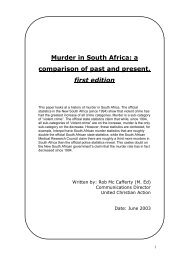The Vumba Tragedy - Elim Missions
The Vumba Tragedy - Elim Missions
The Vumba Tragedy - Elim Missions
You also want an ePaper? Increase the reach of your titles
YUMPU automatically turns print PDFs into web optimized ePapers that Google loves.
commander said that he would be willing to die alongside<br />
Pastor Satuku if the beating did not stop.<br />
Dr David J Maxwell, Editor of the Journal of Religion<br />
in Africa, who was a teacher in Zimbabwe from 1986 to<br />
1989, writes:<br />
“<strong>The</strong> war left the Church in the hands of the local people.<br />
<strong>The</strong>y did not simply appropriate its structures but also its<br />
religious authority. <strong>The</strong> new structures of the Zimbabwean<br />
Church reflected this with its greater emphasis on<br />
lay vocation and<br />
Rumours began to circulate<br />
that several of the men<br />
responsible for the killings<br />
had been dramatically<br />
converted.<br />
an indigenous<br />
leadership. This<br />
renewed closeness<br />
with its base made<br />
it responsive to the<br />
needs of rural people in post-war society. <strong>The</strong> Church<br />
offered them the chance to come to terms with and heal<br />
memories of the war through acts of confession and<br />
restitution. Christians have found meaning for the pain<br />
they experienced through concepts of reconciliation,<br />
sacrifice and, in the specific case of <strong>Elim</strong>, martyrdom. This<br />
dynamic continues today as Christians draw inspiration<br />
from the war through the idioms of testimony and song as<br />
a means to help overcome the hardships of the present.”<br />
Finally…<br />
As a result of the attitude of forgiveness and prayer,<br />
we have seen the work in Zimbabwe flourish rather<br />
than diminish. <strong>The</strong> secondary school is now twice<br />
the size it was before the massacre and the hospital<br />
is making excellent progress not only in treatment<br />
but also in relationships with the government. <strong>The</strong><br />
church is growing and 16 new churches were planted<br />
between 1993 and 2003. Following the massacre,<br />
many people gave funds for a church to be bought as<br />
a memorial tribute and the Mutare Memorial church<br />
was purchased. <strong>The</strong> church continues to flourish<br />
and services are full to overflowing.<br />
What happened in Zimbabwe is not something that<br />
any of us would ever wish to see again, but heaven<br />
must have rejoiced at the dedication, faithfulness and<br />
loyalty of the devoted missionaries. In the plan and<br />
purposes of God, He saw fit to take these workers<br />
home to Himself. It is also clear that the principles<br />
of sowing and reaping are eminently worked out in<br />
each human life, that as we die, so we live.<br />
<strong>The</strong>se missionaries were truly ”promoted to Glory”.<br />
<strong>The</strong> plaque we maintain here at <strong>Elim</strong> International Offices reads as follows:
















